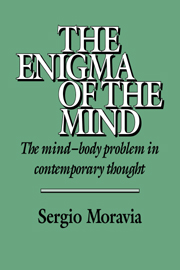Book contents
- Frontmatter
- Contents
- Preface to the English edition
- The enigma of the mind
- The enigma of the mind: Introduction to a metaphor
- 1 Toward a physical science of the mental: Feigl and the (re-)construction of the ‘mind–body problem’
- 2 The apogee of physicalism: The identity theory and materialism in the Australian school
- 3 The obscure relationship: Problems and debates surrounding the identity theory
- 4 Psychology as alchemy: The elimination of the mental in the ‘disappearance theory’
- 5 The mind as function: The functionalist approach to the mind–body problem
- 6 The mind as property and as event: The ‘reformist’ neo-identityism of Kim and Davidson
- 7 The mind as language: The linguistic turn in the mind–body problem
- 8 Speaking in many different ways: The pluralization of descriptions and explanations in the MBP
- 9 The mind as a mode of subjective experience: An interpretive model of the features of the mental
- 10 The mind as ‘subject’ and as ‘being-in-the-world’: Toward a non-mentalistic interpretation of the mental
- Appendix The mental as intentional/‘personal’ emergence: The psycho-personological perspective of Joseph Margolis
- Bibliography
- Name index
6 - The mind as property and as event: The ‘reformist’ neo-identityism of Kim and Davidson
Published online by Cambridge University Press: 05 June 2012
- Frontmatter
- Contents
- Preface to the English edition
- The enigma of the mind
- The enigma of the mind: Introduction to a metaphor
- 1 Toward a physical science of the mental: Feigl and the (re-)construction of the ‘mind–body problem’
- 2 The apogee of physicalism: The identity theory and materialism in the Australian school
- 3 The obscure relationship: Problems and debates surrounding the identity theory
- 4 Psychology as alchemy: The elimination of the mental in the ‘disappearance theory’
- 5 The mind as function: The functionalist approach to the mind–body problem
- 6 The mind as property and as event: The ‘reformist’ neo-identityism of Kim and Davidson
- 7 The mind as language: The linguistic turn in the mind–body problem
- 8 Speaking in many different ways: The pluralization of descriptions and explanations in the MBP
- 9 The mind as a mode of subjective experience: An interpretive model of the features of the mental
- 10 The mind as ‘subject’ and as ‘being-in-the-world’: Toward a non-mentalistic interpretation of the mental
- Appendix The mental as intentional/‘personal’ emergence: The psycho-personological perspective of Joseph Margolis
- Bibliography
- Name index
Summary
KIM: THE MENTAL NOT AS BEING BUT AS “PROPERTY”
Shortly before beginning our discussion of functionalism we made brief mention of another area of thought which has been active in the reform or critical revision of the orthodox identity theory. The terms ‘reform’ and ‘revision’ are not chosen casually. Scholars of this orientation do not, in fact, intend to abandon completely the general inspiration and ambition of the identity theory. Their aim, rather, is to reject certain aspects of this theory while modifying (even radically) several of its key assumptions and arguments. We have also said that these scholars do not compose in any way a “school” or an organic, united group. Their positions do, however, share a common line of reasoning which consists roughly in the following choices: a) a strong commitment to an anti-ontological, or anti-substantialist approach to the mbp – this is especially clear in the crucial redefinition of mental phenomena in terms of properties, modes, or events; b) the development of a psychological and epistemological perspective which, on the one hand, is rather more articulated than that proposed by the identity theory and, on the other, retains certain physicalist (albeit ‘sophisticated’) and monistic (albeit ‘anomalous’) traits; c) the commitment to maintain some form of connection (perhaps causal) between the mental and the bodily, although this connection is to be given a ‘weak’, sui generis interpretation, or is even to be substituted with the new concept of correlation.
- Type
- Chapter
- Information
- The Enigma of the MindThe Mind-Body Problem in Contemporary Thought, pp. 153 - 175Publisher: Cambridge University PressPrint publication year: 1995



